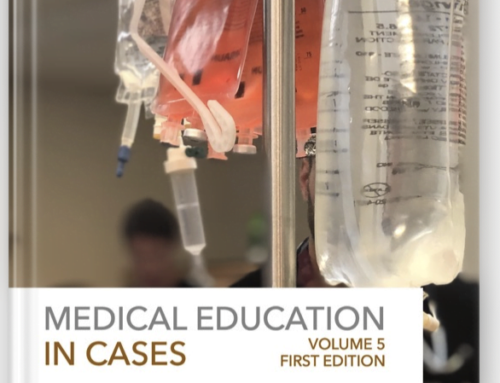 The Case of the New Job Negotiations outlined a situation that every physician goes through. After 10-15 years of education in various forms, we finally need to find a “real” job. Things like “how to negotiate” and “what to look for in a job” are not part of the usual medical curriculum so Teresa Chan (@TChanMD) and I (@Brent_Thoma) thought it would be worth building a MEdIC cases that raises these issues.
The Case of the New Job Negotiations outlined a situation that every physician goes through. After 10-15 years of education in various forms, we finally need to find a “real” job. Things like “how to negotiate” and “what to look for in a job” are not part of the usual medical curriculum so Teresa Chan (@TChanMD) and I (@Brent_Thoma) thought it would be worth building a MEdIC cases that raises these issues.
This follow-up post includes
- The responses of our medical education experts, Drs. Gus M. Garmel and James Stempien
- A summary of insights from the ALiEM community derived from the twitter discussion and comments
- Freely downloadable PDF versions of the case and expert responses for use in continuing medical education activities
Expert Response 1: How do I best fulfill my dreams after EM training?
Gus M. Garmel, MD, FACEP, FAAEM
Clinical Professor (Affiliate) of Surgery (EM), Stanford University School of Medicine
Jamal, my first pearl is not to compare yourself to your colleagues. There is no benefit to doing this. Your situation has unique positives and challenges. Remember that no position will be perfect; it’s important to make the best of the opportunities available.
1. Consider your happiness and passions
Which of these priorities are most important to you: (1) your position; (2) your spouse’s happiness; or (3) where you live? Most emergency physicians are adaptable; your spouse and her career may be less flexible.
It’s possible that your dream position might not turn out exactly as you expect. In the business world, this is referred to as the “bait and switch.” While it’s less common in EM, things happen: the hospital’s finances, staffing needs, academic mission and leadership may change; promises about scheduling and reimbursement may be broken; and planned expansions may not happen.
2. Consider the work environment and position
First, determine what you mean by “education is your passion.” Then clarify this for others and listen to how they respond. This will help you determine if your passion aligns with their mission. Individuals fulfilled by their careers generally base their decisions on the environment, people and opportunities, not money. Hospital location and culture, advancement and growth opportunities, job security, respect, and diversity are critically important. The more opportunities available, the more likely you will flourish.
3. Negotiate your needs keeping theirs in mind
Make your decisions based on your needs and interests. If leadership desires your skills, they will more likely support your goals (which may change over time). Try to avoid being pressured into roles you do not want. This often causes professional and personal stress for new faculty.
Learn how to incorporate your passion for teaching into your practice. This will make your work more joyful and keep you inspired. Strong performance will result in greater opportunities. Use your Clinical Epidemiology skills as a bargaining chip to “sell yourself,” but make sure the “buyers” are aware of your primary interests. Aim for a compromise that is favorable to both sides. If ED leadership isn’t flexible, they probably aren’t the right people to work with.
4. Clinical Work: Important to build your skills
A small percentage of clinical work early in your career might not be best, Jamal. Time in the ED will help you gain clinical experience, improve your teaching skills, and develop research ideas. It is wise that you recognize how advanced coursework might interfere with these objectives.
Here are some questions you may find useful to guide your decision about the PhD:
- Will you lose your position or protected time if you are not accepted in the PhD program?
- Is the PhD required? Do other applicants for the position have PhDs?
- Is the PhD for them or for you? Many outstanding researchers don’t have PhDs.
- What will happen if you leave the program before completing the PhD? Who will pay for your program if you don’t use it as expected or leave the hospital?
- If you develop a patent during your training, who will own the rights? Can you receive royalties?
5. Consider your partner’s situation
Is your wife truly willing to give up her position? If necessary, could she return at her same level of seniority and responsibility? What if one of you dislikes your new position? However, don’t avoid relocating because it’s inconvenient, complicated, or time consuming. A new environment can be exciting. In the business and technology worlds, changing employment every few years increases your upward mobility and professional success.
Summary
Good luck finding the best situation possible for you and your spouse. As soon as you find the right position, commit to it. Interviewing candidates take a lot of time, so once a good candidate is identified, he or she is likely to receive an offer. “Perfect” positions won’t stay open long!
Ideally, your position should offer flexibility and mentorship in a location desirable to you and your spouse. Even better if the group or institution acknowledges your desire to teach, encourages your research and scholarship, and offers you opportunities for advancement and financial reward. You will thrive throughout your career if you find a supportive environment that appreciates outstanding patient care and respects your passion for education.
Expert Response 2: Don’t Overthink it, there’s no right answer.
Dr. James Stempien, BSc, MD, CCFP EM, FCFP, CCPE
Department Head of Emergency Medicine, Saskatoon Health Region
Career choices at the start of your working life can seem so difficult and final, but don’t overthink it. Take your time, look at the options, and make the best decision. There is no wrong answer, just different ways to go. Here are a few things I would tell Jamal to keep in mind as he goes to make his decision.
Priority Setting
It is important to consider your priorities. For Jamal, those seem to be his passion for education, getting his feet wet clinically, being happy in his job and making sure his wife is happy. Those are good priorities to remember.
Take note of all advice
Department heads say stuff like “you’d be a great researcher” because we have a certain obligation to fill the holes that are apparent. In the end, having physicians be happy in the roles that they have chosen is what makes a stronger department. When a Department Head suggests a role, take it as a suggestion. A good department head realizes that you’ll gravitate towards the role you are passionate about and that this is what will be best for you and the docs you work with.
Commit fully now… You can always make a change later
I have found that career or focus changes are not bad things – they help keep us keep sharp and interested. No matter what decision you make now, do not consider it permanent. I think what bothers people the most about career decisions is the belief that they are irrevocable. This either freezes people into inaction or forces them into doing something they do not want to do. Make the decision based on what is best for your career right now and throw yourself into it. At the same time, keep your horizons and ears open. If some other option catches your fancy, follow it. The change will be refreshing and keep you a better, more motivated physician. Staying inspired and interested in what you do will keep you and your whole family happier. It’s easier to be a great dad and a great spouse if you enjoy your work.
Even though you are a new grad you should feel free to negotiate or request the role that you want to play. Tell the chief how you want to contribute and what part of your career is important to you. A good department head knows the longevity and stability of any department largely depends upon the happiness of its members.
Final Thoughts
Sometimes when both options are good and it is impossible to decide between them the final decision comes down to a coin flip. We have to remember that as physicians we are in a very privileged position in society. No matter what decision is made, we’ll have a good income and play an important role in the end. Choosing between two jobs can be like choosing between cherry pie and apple pie, in the end you still get pie.
Curated from the Community
Before getting into negotiations, the community advised Jamal figure out what he wants by thinking hard about several important considerations.
1. Academic versus Community
There was significant discussion on the merits and drawbacks of both types of practice. While some participants stressed the difficulty of moving into academic practice from the community, some veterans felt that this was very possible. The biggest barrier to doing so seems to be the lack of a history of publications and grants which may limit advancement in the academic rat race.
| Academic | Community | |
| Compensation | Less | More |
| Outside commitments | More | Less |
| Teaching opportunities | More | Less |
| Research opportunities | More | Less |
| Educational | More | Less |
| Benefits | More | Less |
For more on this topic check out the great podcast from ERCast in the links.
2. Academic Tracks
In general, it was felt that academic jobs afforded more educational, teaching and research opportunities while community was more lucrative. However, exceptions to those characterizations are prevalent.
The classic academic tracks are research, education and administration. While historically there have been prominent “triple threats,” the participants advised Jamal to focus on at most two of these areas (in addition to clinical work) while becoming more specific in his expertise over time.
Jamal was cautioned against taking on a path that he was not passionate about. It was felt that the right institution for him would recognize and be supportive of his interests because, ultimately, this would be best for both him and his department.
3. Other Considerations
There are multiple other things for Jamal to consider.
His Family:
Not only does Jamal need to be content in his job for him to be happy, but his wife will need to have employment she is happy with. As Ken Milne (@thesgem) put it, “Jamal will have a career in medicine but probably hopes to spend a lifetime with his partner.” Children, especially school-age children, along with the location of other family would further complicate the situation.
The Hospital
Hospitals are as diverse as their emergency departments and ICU’s. The relationship of the ED and the hospital may or may not be supportive of Jamal’s initiatives and goals. This is something to consider, especially when moving to an unknown site.
Politics
The activity behind the scenes at any site being considered is important to know. Things like current challenges, needs and priorities will be important to know as they may affect work once Jamal arrives. The participants advised Jamal to try to get some insight into the “real deal” from experienced mentors, especially when things sound dodgy.
4. Negotiations
Armed with a good understanding of the positives and negatives of each site and what his “need to haves” and “nice to haves” are, Jamal can enter negotiations well prepared.
The most resounding piece of advice for Jamal was to NOT be afraid to negotiate. It was noted that medical students and residents do not get much practice or training in this skill. However, as his ability to do it may dramatically affect his future happiness with his practice, it is something that he should be prepared to devote effort to. He should be able to get communicate his desires clearly to the people he is negotiating with so that they can respond to them.
There was a lot of discussion about what is negotiable. The final list included: time splits, remuneration, number of shifts, and expectations for education, research and administrative work.
A late piece of advice that is discussed widely in the negotiations literature is to “know your BATNA” or “Best Alternative To a Negotiated Agreement.” Effectively, this is another way of saying is what is your next best option if negotiations fall through at your top choice. With more options comes more leverage and a stronger negotiating position. You can figure out your BATNA by talking to multiple other potential employers and getting an idea of what they would be willing to offer you.
The strength of Jamal’s BATNA will depend largely on his options. Are there a lot of open positions in his field or very few? Are positions more highly sought at one of the institutions than another? What have other institutions offered? This will dramatically shift the negotiations. More information on BATNA’s is available in the article linked in the references below.
Several authors advised recruiting the presence of a trusted mentor during the job negotiation process to ensure that someone else is present who can look out for your interests rather than the interests of the department.
While it does not apply to Jamal’s situation, Amy Walsh (@docamyewalsh) also noted some excellent point on negotiating as a woman. Two links are listed below.
Conclusions
The resounding themes of the community comments centered upon the importance of negotiating and finding a match between personal and departmental priorities. To negotiate effectively Jamal will need to know what he wants, what his family wants, what the situation is at the hospitals he is considering, and his alternative options.
Case and Responses for Download
Click Here to download the case & responses as a PDF.
Links
- ERCast: Academic vs Community EM Podcast
- WomenMDResources Podcast on Negotiations
- Negotiations.com on BATNA’s
- Forbes: Art and Science of Negotiation for Women at Work
- Forbes: Why Women Must Ask the Right Way: Negotiation Advice




